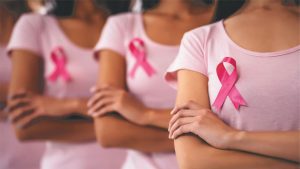By Colin E. Champ, MD, CSCS – Radiation Oncologist
 Here we are again in a sea of pink in an attempt to raise awareness about breast cancer. Everywhere we look, something pink is reminding us about this dangerous disease that affects as many as 1 in every 8 women in the US. The pink campaign has probably been one of the most effective awareness campaigns of the 21st century. Pink ribbons, pink bumper stickers, pink t-shirts, and pink frosted cookies all help us to remember that we should be self-checking and regularly getting checked by our doctors.
Here we are again in a sea of pink in an attempt to raise awareness about breast cancer. Everywhere we look, something pink is reminding us about this dangerous disease that affects as many as 1 in every 8 women in the US. The pink campaign has probably been one of the most effective awareness campaigns of the 21st century. Pink ribbons, pink bumper stickers, pink t-shirts, and pink frosted cookies all help us to remember that we should be self-checking and regularly getting checked by our doctors.
Aside from regular check-ups, is there anything we can do to decrease our risk of this unwanted diagnosis? Is there something in my lifestyle that increases my risk of breast cancer? Is there something I should eliminate or add to my diet that would help me avoid getting it? Much research has been done on this topic and most findings are inconclusive, at best. We all know that tobacco should be eliminated completely, but are there foods we should eliminate as well?
Sugar and Breast Cancer
Much research has been conducted to determine if there is a link between sugar intake and cancer. There are findings showing results on both sides of the argument. However, what is true is that glucose feeds cells in general. It feeds every cell in the body and it is important for brain function, so much so that the body has its own strategies to keep blood sugar at optimal levels. Even if carbohydrates are eliminated from one’s diet, the body will make sugar from other sources.
The notion that sugar directly fuels cancer cell growth, however, can lead to an overreaction, causing people to try to eliminate sugar altogether. This isn’t good for those undergoing cancer treatments who are trying to maintain a healthy weight. What is even more troubling is the stress that comes from beginning such a radical change in one’s diet. Stress increases the “fight or flight” response in our bodies which then increases the production of hormones that raise blood sugar levels and suppress immune function.1
While sugar has not been directly linked to cancer, research does show that it is linked to other factors that influence the risk of getting cancer. Among those are inflammation, obesity, and an increase in insulin. These are listed among the risk factors for breast cancer on any list you look at. Additionally, it has been demonstrated that “women with breast cancer who are undergoing treatment do significantly worse when they gain weight after treatment, something intimately linked with sugar consumption.”2
Salt and Breast Cancer
While salt has not been definitively shown to have a direct link to cancer in formal studies, a recent study has raised eyebrows in the medical community. The study was conducted on healthy men and women. The participants were placed on a low salt diet. After seven days, they were given several tests to see how this dietary change affected each one. Interestingly, like studies that show the link between the elimination of sugar and cancer, this study showed that the stress this caused to the participants also triggered the “fight or flight” response, as mentioned above. Furthermore, it showed that their low salt diet caused insulin resistance, which in turn required more insulin in order to lower their blood sugar. High blood sugar can not only be fatal, but it is also associated with higher risk of breast cancer.3
Even though most research shows the evils of salt in our diet, this study shows an interesting, new perspective. The findings may not be widely accepted as of yet, but it is clear that more research is needed. As with the studies on sugar, there are convincing arguments on both sides.
Conclusions
The American diet is famously unhealthy. Obesity is rampant and has been shown to contribute directly to increased cancer risks. Maintaining a healthy weight through diet and exercise is crucial. If you are overweight, talk to your doctor about ways to get healthy. Choose a plan that works for you and follow through. Get started today and decrease your risk for cancer before it is too late.
If you would like more information on sugar, salt, and the science of breast cancer, contact Dr. Colin Champ, MD, CSCS. Dr. Champ is a radiation oncologist with board certifications in radiation oncology and integrative and holistic medicine. He is a certified strength and conditioning specialist, and his research interests include the prevention and treatment of cancer with lifestyle modification, including exercise and dietary modification.
1. Gill, Colleen MS, RD, CSO. “Eat Right to Fight Cancer.” Oncology Nutrition,
July 2014, www.oncologynutrition.org/erfc/healthy-nutrition-now/
sugar-and-cancer.
2. Champ, Colin MD. “Celebrating Breast Cancer and Sugar.” Colin Champ,
MD, 26 Oct. 2016, www.colinchamp.com/celebrating-breast-cancer-
and-sugar/
3. Champ, Colin MD. “Breast Cancer and Salt – Can Reducing Salt Increase our
Risk?” Colin Champ, MD, 17 Apr. 2016, www.colinchamp.com/breast-
cancer-and-salt/.
Dr. Colin Champ, MD, CSCS
Dr. Colin Champ, MD, CSCS, is a radiation oncologist with board certifications in radiation oncology and integrative and holistic medicine. Dr. Champ is a certified strength and conditioning specialist, and his research interests include the prevention and treatment of cancer with lifestyle modification, including exercise and dietary modification.
INSPIRE EXERCISE MEDICINE
239.429.0800
www.Inspireem.com
3555 Kraft Road, Suite 130, Naples, FL 34105









